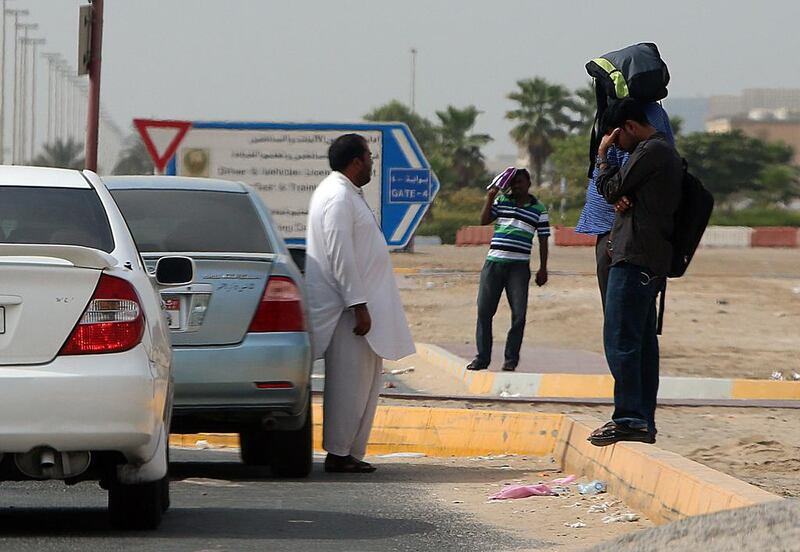ABU DHABI // When Abu Dhabi's white-and-gold taxis were taken off the road at the end of 2012, an illegal cab business began to thrive on the city's outskirts.
Drivers park next to a fleet of more than a dozen orange-and-white Nissan Sunny learner-driver cars outside the old Emirates Driving Company building in Mussaffah.
These unlicensed cabs have found a ready clientele among students at the driving institute keen to split the fare for the commute into the city. They pay Dh10 each for the trip, with four sharing. A journey within the Mussaffah area costs Dh5 each.
Imran Sajid, 24, from Pakistan, opened his driver training file last week. He does not mind sharing, which saves him the Dh55 metered fare of a silver cab licensed by the Centre for Regulation of Transport by Hire Cars, or TransAD.
“I can’t afford to pay more than Dh100 for a two-way trip in a silver taxi,” said Mr Sajid, who hopes to get his heavy vehicle driving licence and land a job at a construction company.
Many choose to travel illegally every day, said Shamim Hussain, 32, a private driving instructor. “Of course they’re much cheaper than the silver taxis,” he said. “If they take the bus, the trip to the city is about an hour and a half.”
Another driving instructor, Amjad Hussain, 31, agreed. “These people are paid low salaries, between Dh1,000 and Dh1,200 a month, and do not have any choice,” he said.
Officials at the Emirates Driving Company said yesterday the illegal taxis near their school did not fall under their purview, then declined to comment further.
The owner of a Toyota Camry taxi, who did not wish to be named, said he charges Dh40 to the city, or Dh10 each for four passengers.
Although unemployed and aware of the risk of a substantial fine, the 40-year-old Pakistani driver is not interested in working for one of the six franchises governed by TransAD.
Offenders can be fined between Dh5,000 and Dh10,000 and jailed for 30 days. “Many have been fined Dh8,000 and had their licences suspended for three months,” said the driver.
TransAD officials were not immediately available for comment, but had earlier warned the public not to use unauthorised taxis because the vehicles were not properly equipped for the safety of passengers and may not even be insured.
In addition, the drivers are not linked to an employer and cannot be easily prosecuted should any problems arise.
The Emirates Driving Company has a designated pick-up point for taxis at a car park inside its gated compound.
Syed Shabir, 40, a Pakistani who drives for Arabia Taxi, said private taxis should not be allowed to operate and undercut the business of licensed taxi companies.
“They’re cheaper but not safe and are illegal,” he said. “Our speed limits are being monitored and TransAD recently installed CCTVs in our taxis.”
Last month, TransAD announced a year-long project to install CCTVs to monitor journeys and ensure the safety of the driver and passengers.
One hundred cars being fitted with cameras are in the roll-out stage, while the second phase will be carried out within the year to cover the entire TransAD fleet.
“Passenger safety is important,” said Mohammed Malik, who drives for Al Ghazal taxi and works 16 to 17 hours a day to meet his daily target of Dh480.
“I drive within the speed limit, wear my seat belt, don’t use my mobile while driving and of course I don’t cross a red light.”
rruiz@thenational.ae






